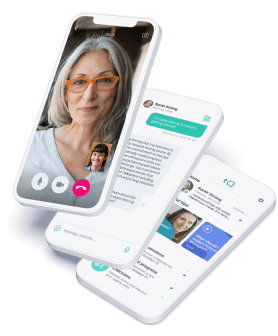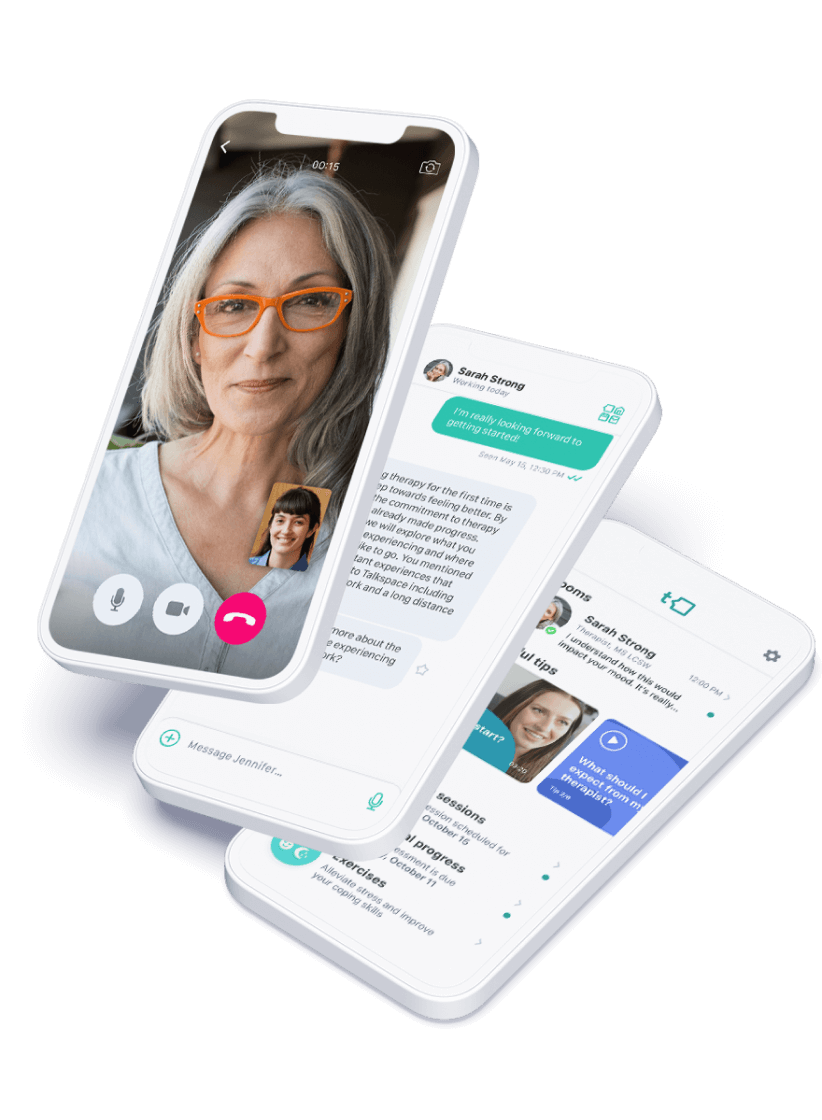Updated On: May 3, 2024
Overview
Updated on 3/09/2023
Depression is a debilitating mood disorder that affects between 12-18% of adults in the United States each year. One of the answers to how to treat depression is therapy. Fortunately, various types of psychotherapy have been known to effectively treat depression. Each has its own specialized benefits, but not all therapy is the same. It’s worth looking at each of the major types of therapy for depression that are available. Then you can begin on the most effective path toward managing your depression.
Psychotherapy — also referred to as talk therapy — is extremely effective for treating depression on its own, but it’s often used in conjunction with other forms of therapy and/or prescription medication to treat depression. Therapy can help you to dive deeply into the possible underlying causes of your depressed mood. It can teach you new skills to help you cope with and alleviate your depressive symptoms.
Keep reading to learn more about the 7 types of therapy for depression you can try. With a little bit of time, help, and patience, you can get back to living your life.
Types of Therapy for Depression
What’s the best therapy for depression? Unfortunately, there’s no simple answer to that question. The right therapy for your depression will depend on several factors, including:
- Your goals for therapy
- The type of depression you have
- Your depressive symptoms and severity
- Your own personal choices
- Your willingness or ability to “put in the work” (at therapy)
Each of the therapeutic modalities outlined below has evidence that supports their benefits and efficacy in treating depression. First, it’s important to briefly look at what psychotherapy is in a broader sense.
Psychotherapy involves talking to a mental health professional. However, there’s a lot more to it than that. A licensed mental health professional is trained in various techniques that can help you to recover from clinical depression and increase your general sense of wellbeing.
Let’s examine some different types of psychotherapy used to treat depression (whether that be clinical depression, mild depression, moderate depression, or severe depression).
1. Cognitive therapy
Negative thinking contributes to the development and exacerbation of depression symptoms. If you’re stuck in a perpetual loop of negative thoughts, it can be incredibly difficult, some would argue virtually impossible, to find a positive attitude and feel good about your day.
Cognitive therapy is based on the idea that you can control your emotions with your thoughts. During cognitive therapy sessions, you’ll learn to identify negative thinking patterns, which are clinically called cognitive distortions. You’ll focus on learning how to turn cognitive distortions into positive thoughts and behaviors, which can help to improve your mood.
2. Behavioral therapy and behavioral activation (BA)
Instead of focusing on how we can control our thoughts to alleviate depression like cognitive therapy does, behavioral therapy focuses on changing certain behaviors that can cause your negative emotions.
A core focus of behavioral therapy is a tactic called behavioral activation (BA), which involves engaging in certain activities that will likely enhance well-being. BA focuses on identifying and working towards specific goals to enhance your long-term coping strategies. It also focuses on overcoming avoidance behaviors, like not wanting to go out in public. Small steps and positive reinforcement are used to build confidence, positivity, and a sense of accomplishment.
It’s important to note that BA is not often used on its own, and it’s a fairly new depression therapy technique. Studies are beginning to look deeper at its efficacy on depression — especially in young people — but many experts believe more research needs to be done. That said, research does show promise for BA in treating mild depression to moderate depression, even when used on its own.
3. Cognitive behavioral therapy (CBT)
Cognitive behavioral therapy for depression combines the two well-established therapy techniques — cognitive and behavioral therapies. Since both are known to be effective forms of treatment for severe depression, they work well together and can be used as a powerful technique called cognitive behavioral therapy, commonly referred to as CBT. This type of psychotherapy focuses on changing both negative thought processes and behaviors that contribute to depression symptoms.
According to research, CBT offers some of the most promising evidence for effective therapeutic treatment for depression available. It can help reduce symptoms of depression, but beyond that, it also helps prevent relapse.
CBT can teach you how to recognize your thought and response patterns so you can learn new ways to think and behave that are more conducive to your overall happiness. This goal-oriented therapy often incorporates homework to further your progress. For example, it can include several self-help strategies, including:
- Daily journaling
- Meditation
- Exercising
- Eating healthy
- Sleeping well
- Identifying your core beliefs
All of these can help you learn how your core beliefs may be affecting you psychologically and causing your depression.
4. Dialectical behavioral therapy (DBT)
Dialectical behavior therapy (DBT) is a sub-discipline of cognitive behavioral therapy. The primary difference between DBT and CBT is that you’re encouraged to acknowledge and accept your negative behaviors and thoughts in DBT. This therapy technique has been found effective in treating depression in some people.
A therapist will teach you the practice of validation. Over time, this can allow you to come to terms with your negative thoughts and emotions. You’ll learn new ways to cope with stress and anxiety and focus on how to improve interpersonal relationships.
DBT for depression often incorporates mindfulness meditation, which teaches awareness of your breathing and thoughts as they develop. As you continue to practice, you’ll become better-equipped to anticipate and proactively deal with your depression before it gets out of hand.
5. Family constellation therapy
How about for families? What is the depression treatment option for them? Family constellation therapy is a group therapy technique that helps identify familial behaviors that might be contributing to mental health conditions and concerns like depression. It allows you to look at the family dynamics that might be contributing to your overall mental health, so you can begin to see things through a different lens and perhaps improve depression symptoms along the way.
“Family constellation therapy can be effective with ancestral trauma which can show up as depression. Family constellation therapy can address inner child wounds, relationship conflict, and self-acceptance. It can be described as improvisational group therapy because without a script, feelings are expressed in the moment, and new insights are made.”
 Licensed Clinical Social Worker (LCSW), DD Karmen Smith
Licensed Clinical Social Worker (LCSW), DD Karmen Smith
6. Interpersonal therapy (IPT)
This depression treatment helps you focus on the interpersonal conflict you might be experiencing that’s resulting in your depression. By examining and focusing on the interpersonal relationships you have and the current and former social roles you’ve experienced, you can learn how to identify the roles you tend to play in the important relationships in your life. Thus, you can learn to resolve conflicts, which can ultimately help with symptoms and feelings of depression.
A major goal of interpersonal therapy includes learning how to build a strong, reliable social support system, which can be incredibly beneficial when you’re dealing with depression.
7. Psychodynamic therapy
Here’s another mental health treatment that falls under psychological therapy. Psychodynamic therapy, also known as psychoanalytic therapy, is a form of therapy that can work to treat depression that results from unresolved (typically childhood) conflict. Many times, these conflicts can even be unconscious.
Psychodynamic therapy helps you become aware of and able to identify the emotions that might be difficult for you to acknowledge. It’s slightly different from some other approaches to treating depression in that it’s often longer-term.
Finding a Therapist for Depression
Globally, depression is one of the most common mental health conditions we face today. It’s also very treatable in most cases. If you or someone you care about is living with depression, it’s important to find the right type of professional help. At the very least, you can also work to find the causes of your depression.
You can begin the process by contacting your family doctor and asking for a referral to a local mental health professional. You’ll likely find that working with a professional therapist is calming and empowering.
It’s rewarding to take charge of your life. Therapy can teach you new coping skills aimed at helping you manage depression symptoms on your own as you see them arising. In most cases, significant improvements are seen and felt within 5 – 20 weekly sessions. However, keep in mind that there’s no standard, and each case is unique.
If your symptoms are severe and require immediate attention, don’t hesitate to call the Substance Abuse and Mental Health Services Administration (SAMHSA) National Helpline at 1-800-662-HELP (4357). This free service is available 24 hours a day, every day of the year, offering assistance in both English and Spanish.
Supplementing Your Therapy Experience With Medication
Regardless of the type of psychotherapy you choose, some research suggests that combining prescription antidepressant medication with depression therapy — especially in the beginning of treatment — can be a more helpful approach than just using therapy alone. This is partly because there’s a complex blend of potential causes of depression and other mood disorders. Adding in antidepressant medication or vitamins for depression might offer a more inclusive treatment approach while you’re learning coping techniques at the beginning of treatment. If you’re interested, learn how to get depression medication with Talkspace.
Developing an honest and open relationship with a trained mental health professional can help you identify, navigate, and overcome your negative emotions and behavioral patterns in real time.
Start Online Therapy for Depression With Talkspace
Talkspace is a unique therapeutic experience, where you can get the help you need for your depression from the comfort of your own home. If you can’t meet with a therapist in person, consider trying our online therapy service. Our online platform pairs you with a skilled mental health professional who can help you address and deal with your depression so that you can begin your journey of healing.
See References
-
US depression rate
USAFacts. Published 2021. Accessed February 25, 2022.
-
Cognitive Therapy (CT)
https://www.apa.org. Published 2020. Accessed February 25, 2022.
-
Is behavioural activation effective in the treatment of depression in young people? A systematic review and meta-analysis
Tindall L, Mikocka-Walus A, McMillan D, Wright B, Hewitt C, Gascoyne S. Psychology and Psychotherapy: Theory, Research and Practice. 2017;90(4):770-796. doi:10.1111/papt.12121. Accessed February 25, 2022.
-
Behavioural activation for depression: Efficacy, effectiveness and dissemination
Soucy Chartier I, Provencher M. J Affect Disord. 2013;145(3):292-299. doi:10.1016/j.jad.2012.07.023. Accessed February 25, 2022.
-
The process and delivery of CBT for depression in adults: a systematic review and network meta-analysis
López-López J, Davies S, Caldwell D et al. Psychol Med. 2019;49(12):1937-1947. doi:10.1017/s003329171900120x. Accessed February 25, 2022.
-
Meta-Analysis and Systematic Review Assessing the Efficacy of Dialectical Behavior Therapy (DBT)
Panos P, Jackson J, Hasan O, Panos A. Res Soc Work Pract. 2013;24(2):213-223. doi:10.1177/1049731513503047. Accessed February 25, 2022.
-
The Effectiveness of Family Constellation Therapy in Improving Mental Health: A Systematic Review
Konkolÿ Thege B, Petroll C, Rivas C, Scholtens S. Fam Process. 2021;60(2):409-423. doi:10.1111/famp.12636. Accessed February 25, 2022.
-
The effectiveness of long-term psychoanalytic psychotherapy—A meta-analysis of randomized controlled trials
Smit Y, Huibers M, Ioannidis J, van Dyck R, van Tilburg W, Arntz A. Clin Psychol Rev. 2012;32(2):81-92. doi:10.1016/j.cpr.2011.11.003. Accessed February 25, 2022.
-
Major Depression
National Institute of Mental Health (NIMH). Published 2022. Accessed February 25, 2022.

Dr. Karmen Smith is a board-certified Clinical Social Worker in the state of Nevada. She has worked over 20 years for Clark County Family Services with abused and neglected children in the shelter, adolescents in juvenile detention, and adults who have suffered severe trauma. Dr. Smith is a shamanic teacher and minister of metaphysics and her doctorate is in Pastoral Counseling.
Articles about Depression: Symptoms, Causes & Treatment
View all articles
What to Do if Your Teenager is Making You Feel Depressed

Post-Weaning Depression: Recognize the Signs & Find Support

How to Think Positive When Depressed: Techniques for a Brighter Outlook

Have You Fallen Out of Love, or Are You Depressed?

How to Prevent Postpartum Depression

How to Explain Depression to Someone

Are There Stages of Depression?

Can Adderall Cause Depression?

Can Depression Cause Memory Loss?

14 Effective Coping Skills for Depression


